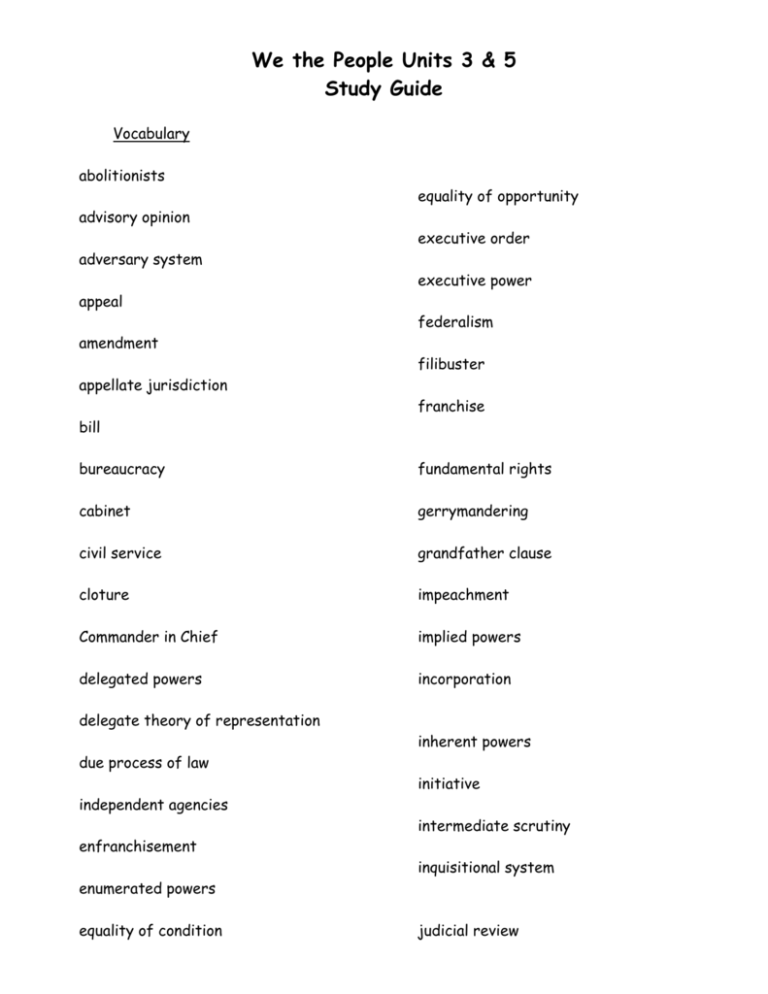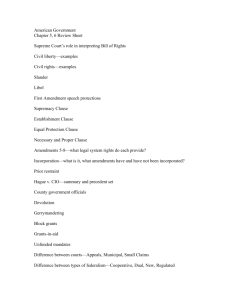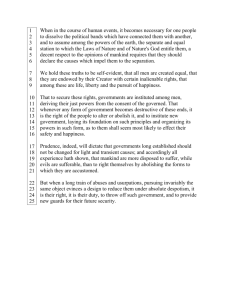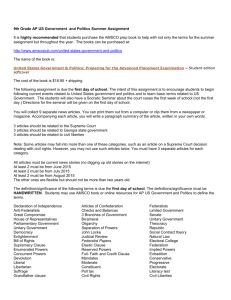We the People Unit 3 - Union School District
advertisement

We the People Units 3 & 5 Study Guide Vocabulary abolitionists advisory opinion adversary system appeal amendment appellate jurisdiction bill equality of opportunity executive order executive power federalism filibuster franchise bureaucracy fundamental rights cabinet gerrymandering civil service grandfather clause cloture impeachment Commander in Chief implied powers delegated powers incorporation delegate theory of representation due process of law independent agencies enfranchisement inherent powers initiative intermediate scrutiny inquisitional system enumerated powers equality of condition judicial review jurisdiction landmark decision litigant literacy test local governments lobbying methods of constitutional interpretation quasi-judicial powers quasi legislative powers rational basis recall referendum reserved powers original jurisdiction resolution party system secession patronage sedition platform seniority pocket veto police powers political party power to investigate poll tax procedural due process separate but equal strict scrutiny substantive due process ticket trustee theory of representation writ of certiorari Lesson 15 Criticism of judicial review Types of Constitutional amendments Reasons for and against a Bill of Rights Marbury v Madison Lesson 16 Development of political parties “Revolution of 1800” Lesson 17 Southern justification for seceding from the Union Black Codes Enforcement of the Civil War Amendments Fourteenth Amendment Confederated States of America Constitution Laws designed to destroy the political power of African Americans following the Civil War Lesson 18 Characteristics of an adversary legal system Fundamental rights identified by the Supreme Court Lesson 19 Equal protection clause guarantees Plessy v. Ferguson Brown v Board of Education Lesson 20 Establishing of voting eligibility Extending voting rights to African Americans Extending voting rights to women Extending voting rights to Native Americans Extending voting rights to 18 year olds Lesson 21 and 22 What is the distribution of powers between the national government and the states called? How does Congress represent both the states and the people? The scope of the national government grew significantly with the Supreme Court’s interpretation of which clause? Congress’s power to investigate is an example of which power? Who represents our district in the U.S. House of Representatives? Who represents Oregon in the U.S. Senate? What is the primary method Congress uses to consider proposed legislation? How can Americans influence Congress? What are some of Congress’s enumerated powers? What is another name for implied powers? What are examples of implied powers? Who is the current Speaker of the House? Who is the Senate President? Who is the President pro tempore? Lesson 23 How has the executive branch changed since the First Congress? What are the Constitutional requirements to be a president? What are some of the roles of the president? What are some of the president’s Constitutional Powers? What are the some of the president’s military powers? What are the some of the president’s diplomatic powers? How does the president use appointment powers? How does the president use veto powers? Lesson 24 What is the importance of administrative agencies? What contributes to the number of administrative agencies? Lesson 25 From where does the authority for the court system come? How does the United States Supreme Court decide which cases to hear? What types of decisions can the Supreme Court make? Who was the first Chief Justice of the Supreme Court? Who is the current Chief Justice of the Supreme Court? Who else sits on the Supreme Court? Lesson 26 Why does the U.S. have a federalist system? What are the federal obligations to the states? What are some alternatives to federalism? What are the advantages and disadvantages to a federalist system? Why are states called “laboratories of democracy”? How has Oregon been a laboratory of democracy? How are state governments organized?







